
THE EXIT PLANNING BLOG
Keep up-to-date with exit planning, succession planning, industry trends, unique specialty insights, and useful content for professional advisors and business owners.
Share this
A Trip to the Movies: Business Exit Strategies in Classic Films
by Colleen Kowalski on November 9, 2021
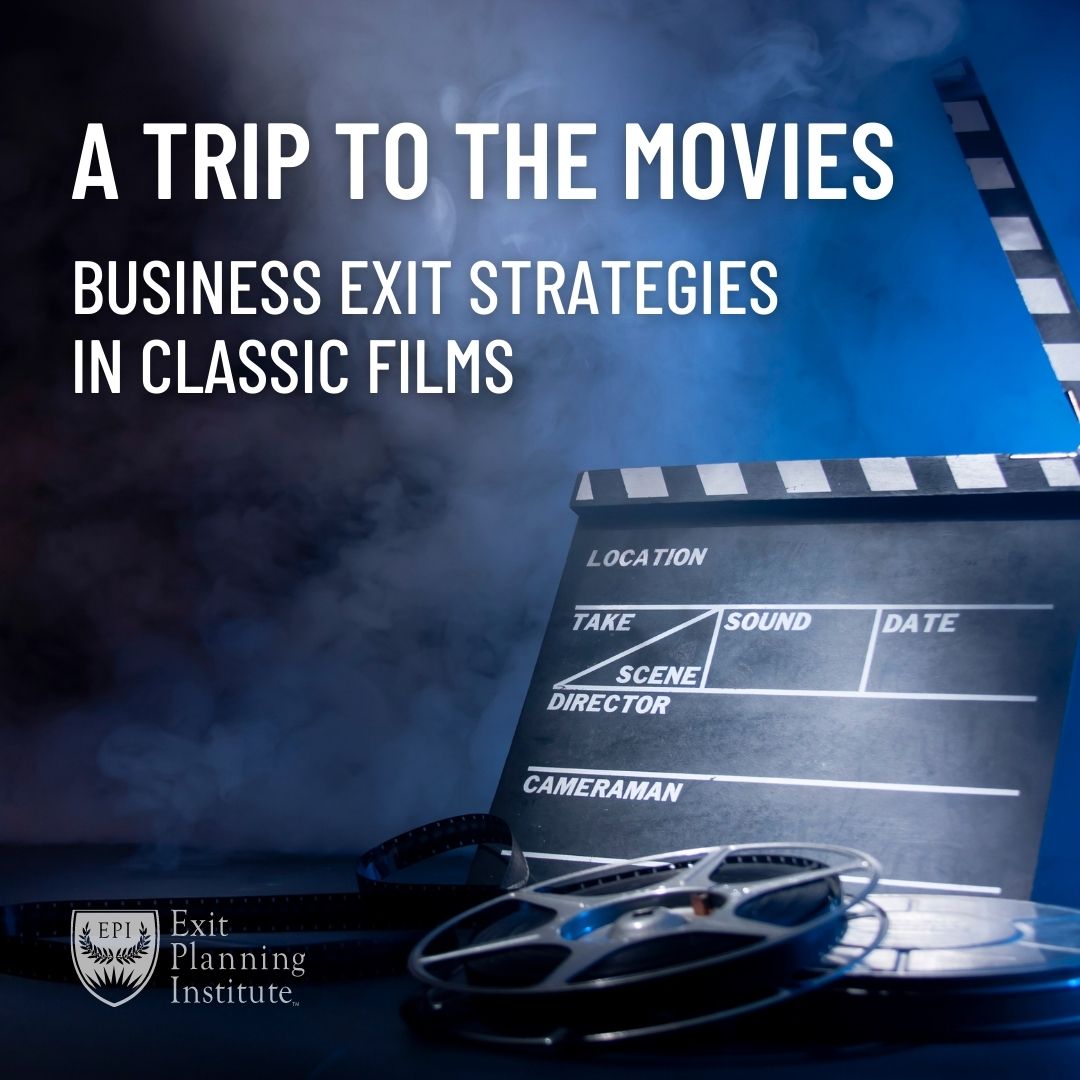
Everyone has a favorite movie. Whether that movie is something critically acclaimed like Citizen Kane, reminiscent of their childhood like Beauty and the Beast, or a cult classic like Pulp Fiction. We all have a movie that comes to mind as our absolute favorite to watch after a long day at the office.
However, some of the most popular movies incorporate exit planning lessons into their plot, whether intentionally or by chance. We compiled a list of some of our favorite movies with exit planning topics for your next movie night!
Willy Wonka and the Chocolate Factory (1971)
Exit Planning Topics: Core Values, Succession Planning
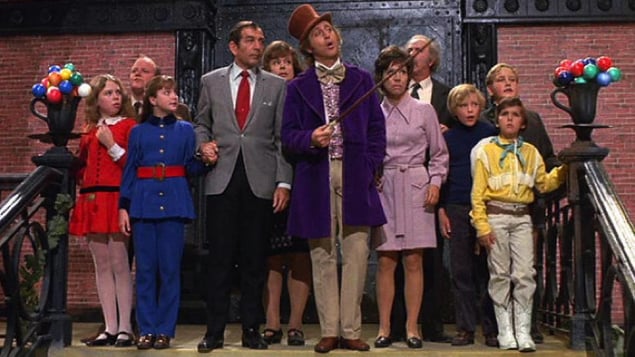
To the untrained eye, Willy Wonka and the Chocolate Factory is the story of a crazy old chocolatier who over the course of a few hours, slowly injures numerous children via his otherworldly chocolate factory. In the end, only one child, Charlie, and his grandfather remain. However, this movie is more than simply an old man torturing children with candy. It highlights the importance of choosing the right successor for your business.
We know what you are thinking, “Wow, that seems like a pretty big leap to make, and right off the bat too!” But hear us out.
Willy Wonka gifts five golden tickets to lucky children across the globe. These tickets allow the children to visit his factory and win a lifetime supply of chocolate. However, they must not touch or eat anything in the factory, or they will be eliminated and lose their prize. Charlie and his grandfather make it to the end of the tour, drink some fizzing soda, and are almost eliminated. However, Willy Wonka praises Charlie for his ability to not sell his secret candy recipe and rewards him for it. Wonka tells Charlie that when he retires, he will give his factory over to Charlie and his family.
Willy Wonka put a succession plan in place, albeit a very elaborate plan that saw one unfortunate little girl turn into a blueberry, but a plan nonetheless. He was eager to find a successor that not only had a passion for the industry but exhibited the core values he desired in a future chocolatier. Willy Wonka highlights the importance of choosing a successor based on a strong cultural fit. We don’t recommend his schemey ways to determine your potential successor’s core values though.
The Godfather (1972)
Exit Planning Topics: Family Business, Succession Planning, The Five Ds
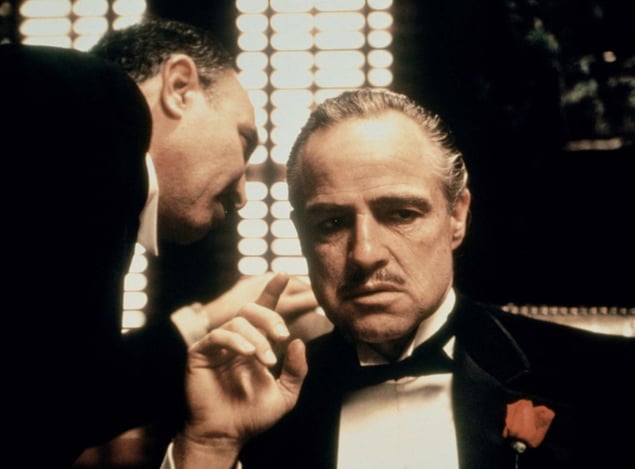
The Godfather, in the most basic terms, shares the story of a “family business.” The Corleone family highlights the importance of strong family planning. As the Corleone family is a powerful organized crime family, they face the Five Ds on a regular basis.
Don Vito Corleone, the head of the crime family, has four children. His three sons are all involved in the “business” in some form or another. After Vito is shot, the business falls into the hands of Sonny. When Sonny is killed by a rival crime family, the business goes to Michael Corleone. Even though Fredo is the oldest son, Vito does not leave the business in his hands, because he is extremely unqualified and is not trusted to drive the family business to success.
The Corleone crime family represents how significant businesses incorporate succession planning in their day-to-day business operations. The Corleone family is prepared for the worst (aka the murder and attempted murder of several members of their family). This allows the family to succeed even with the potential of the Five Ds to ruin their business.
While hopefully your business never has to deal with the numerous calamities the Corleone family faces, preparing for the worst by derisking your business is one of the best ways to build and protect the value in your business.
Tommy Boy (1995)
Exit Planning Topics: Family Business, Succession Planning, The Five Ds, The Four Cs, Owner Centralized Business
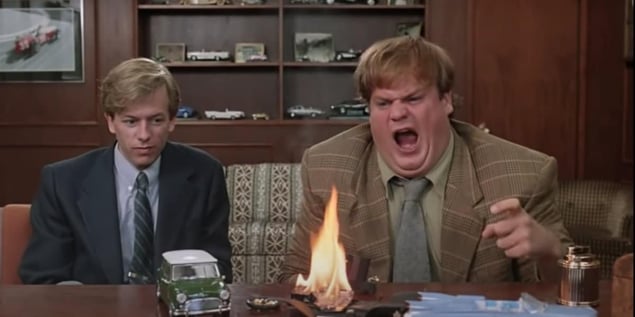
If you follow Exit Planning Institute President, Scott Snider, on LinkedIn, you no doubt saw his amazing recap on the movie Tommy Boy. This movie is the embodiment of failing to position your business with the end in mind. Scott shared, “Callahan Auto Parts was a successful company. Seemingly the Callahan’s lived a nice life. Big house, nice cars, cool things. The employees seemed happy. The customers loved the product. But when it was time to transition the company, it was a total failure. Why? Because Big Tom Callahan had built something successful, not significant.”
When Big Tom Callahan died, everything that made the business a success died with him. He was responsible for the customer relationships and nearly all the sales depended on him. Callahan Auto is a prime example of the need to decentralize the owner from the business. A business should not be entirely dependent on one individual’s successes in order to thrive.
The business also lacked strong structural capital. The organizational systems in place were basically sticky notes and stacks of paper buried in a desk. This “system” is not a repeatable nor scalable one and will cause many inaccuracies in reporting for future business.
Billy Madison (1995)
Exit Planning Topics: Family Business, Succession Planning
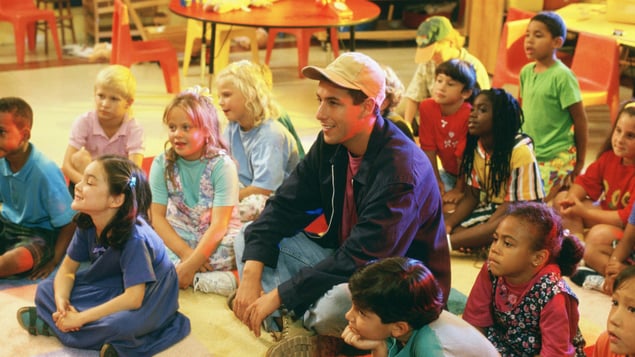
Looks like 1995 was a big year for family business succession-themed movies! Billy Madison tells the story of a 27-year-old manchild who must prove to his father that he is smart enough to take over the family hotel business – by passing twelve years of school in 24 weeks. Should he fail, the business goes to the devious Vice President instead.
Unusual premise aside, this movie represents the struggle many family business owners face when selecting a successor. Do I choose to keep the business in the family, even though the next generation is not qualified? Or do I choose a successor outside of the family and fail to continue the family legacy?
Billy Madison also highlights the importance of educating the next generation before they take over the family business. Prior to handing over the reins to your son or daughter, have them shadow all departments in your company so they gain an understanding of every aspect of the business.
The Social Network (2010)
Exit Planning Topics: Partner Disputes, The Five Ds, The Four Cs
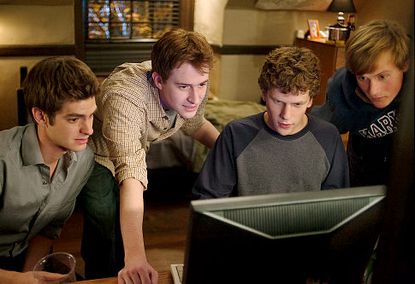
The Social Network tells the story of the creation of Facebook. As in every entrepreneurial journey, many conflicts arise between the partners as they build their business. The film follows Mark Zuckerberg and his various partners, as they develop, launch, and expand Facebook.
In the film, Mark Zuckerberg initially creates “TheFacebook” with his Harvard University roommates to rank the women on campus after he was dumped by his girlfriend. He then expands the social networking site to other ivy league schools when he determines the need for networking in his desired customer base. This initial expansion of the company and the switch from a platform used to rank women into a way to connect people highlights the importance of knowing your customers. Zuckerberg strengthened his customer capital by building a well-developed site.
Mark Zuckerberg and Co-Founder of Facebook, Eduardo Saverin, faced a large dispute over how to manage the business as it grew larger. Saverin froze the company’s bank accounts without informing Zuckerberg. This action represents how the Five Ds can harm a seemingly strong business.
Tensions between the partners rose higher when an angel investor, Peter Thiel, invests $500,000 in the business. This investment ultimately decreased Saverin’s stake in the business from 34% to less than 0.03%. With just one disagreement the partnership between Zuckerberg and Saverin was forever harmed.
Minimize the risk of partner disagreements in the exit planning process by creating a separation agreement. This document includes everything that should be executed by each partner and other executive leadership in the company prior to one or both partners’ exit. This partnership agreement will also mitigate financial disputes and liability issues that may arise during a partner’s exit.
Wildcard: Any Movie with Some Version of This Line, “I’m not throwing away my dream, *parent*. I’m throwing away yours.”
Exit Planning Topics: Family Business, Succession Planning
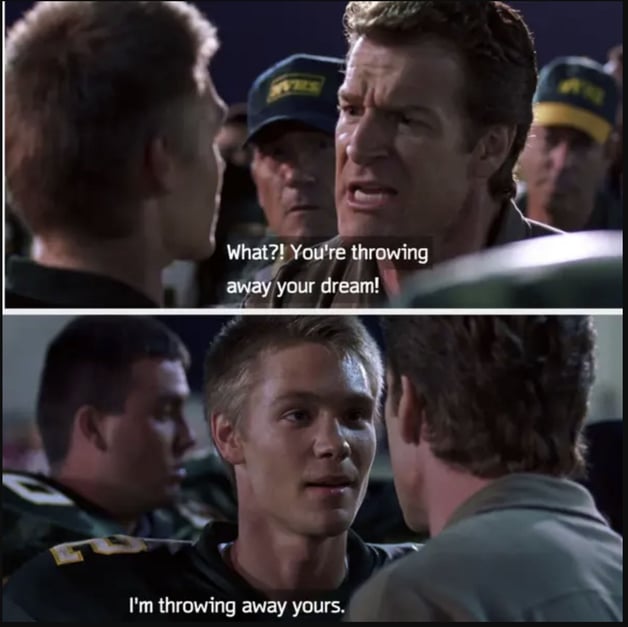
This line is a classic and almost always occurs between a high school student and a parent trying to live vicariously through their child. Some form of this line can be seen in High School Musical, Center Stage, Ice Princess, Varsity Blues, and A Cinderella Story. Typically this line is used when a star athlete decides not to follow in their parent’s footsteps and chooses their own path instead.
In A Cinderella Story, this line depicts Austin Ames, a football player, and his dad when Austin admits he does not want to work at his father’s car wash. Instead, Austin follows his dreams, and girlfriend, because it is a romantic comedy after all, to Princeton to become a writer.
While it may seem like a stretch, go with us on this. As a family business owner, have you actually asked your successor if they are interested in taking over the family business? Did you simply assume that your “dream” would be the same as theirs? Without having tough conversations about the future of their business, family business owners will fail to have a detailed succession plan in place. Your children are not “giving up their dream” but if you fail to ask them about their dreams, you could end up losing yours.
Did we miss any exit planning lessons in movies? Share your favorite movies with exit planning topics with us on LinkedIn!

Are you looking to expand your exit planning knowledge base and earn the industry-leading Certified Exit Planning Advisor (CEPA) credential? Treat yourself to our Save on CEPA Package! Want to become a master of exit planning and market yourself to owners in a more effective way? Our CEPA Mastery Bundle is here to give you the ultimate deal. Or maybe you’re looking to fill your bookshelves with expert views on marketing, family business, exit strategy, and business value? Receive bundle discounts on an entire Exit Planning Library.
Get the Deals!Share this
- Blog (550)
- CEPA (433)
- exit planning (249)
- CEPA community (189)
- Business Owner (176)
- Exit Planning Summit (100)
- EPI Chapter Network (89)
- Value Acceleration Methodology (81)
- Exit Planning Partner Network (76)
- EPI Announcement (50)
- Content (48)
- Webinars (37)
- Excellence in Exit Planning Awards (34)
- Marketing (30)
- 2024 Exit Planning Summit (28)
- 5 Stages of Value Maturity (26)
- Books (24)
- EPI Academy (24)
- EPI Team (22)
- Exit Planning Teams (22)
- Leadership (21)
- 2023 Exit Planning Summit (20)
- family business (20)
- women in business (19)
- Intangible Capital (18)
- Exit Options (17)
- Black Friday (16)
- CPA (15)
- Walking to Destiny (15)
- Chapters (14)
- State of Owner Readiness (14)
- charitable intent (13)
- Chris Snider (12)
- National Accounts (12)
- Small business (12)
- personal planning (12)
- Financial Advisors (11)
- Season of Deals (9)
- 5 Ds (8)
- About us (8)
- Podcast (8)
- Scott Snider (8)
- Insiders Bash (7)
- Christmas (6)
- Exit Planning Content Library (6)
- Case Studies (5)
- Owner Roundtables (5)
- Three Legs of the Stool (5)
- Value Advisors (5)
- financial planning (5)
- Awards (4)
- Circle of Excellence (4)
- DriveValue (4)
- EPI Thought Leadership Council (4)
- Exit & Succession (4)
- Five Ds (4)
- executive training (4)
- Owners Forum (3)
- author (3)
- forbes (3)
- Exit Is Now Podcast (2)
- Peter Christman (2)
- Veteran (2)
- Whitepapers (2)
- Annual Exit (1)
- Business Owners Forum (1)
- SOOR (1)
- business consultants (1)






